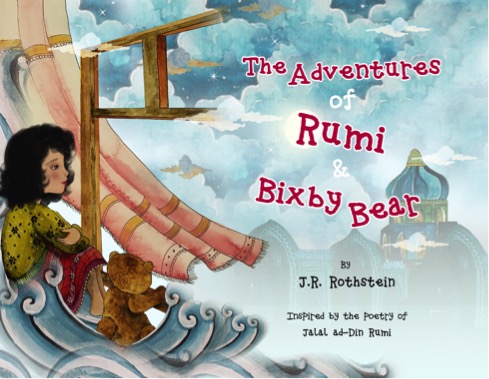When a distant cousin sent me an illustrated book for children and told me that its content might be helpful to my work as a coach of business leaders, I didn’t plan to give it a second glance. After all, I’m in my fifties, child free, and work with adults. However, the child in me was taken by the title and cover artwork depicting a young girl and a teddy bear about to embark on a magical journey. The Adventures Of Rumi And Bixby Bear is an enchanting book that gives hope to the inner child in all of us. I would have loved this book as a small child. I love it now.
Although Jalāl ad-Dīn Muhammad Rūmī, popularly known as Rumi, was a 13th-century Persian poet, faqih, Islamic scholar, theologian, and Sufi mystic originally from Greater Khorasan in Greater Iran, his influence transcends national borders and ethnic divisions. In 2015, the Turkish-British novelist, Eli Shafak told of Rumi’s quest for beatitude through friendship in her blockbuster novel, The 40 Rules Of Love. And just as Shafak popularised the Persian Poet’s work with an adult audience, Rumi and Bixy Bear, promises to bring Rumi’s teaching to many young readers for the very first time.
Rumi wrote: “Yesterday I was clever, so I wanted to change the world. Today I am wise, so I am changing myself,” and J.R. Rothstein, the book’s author—a real estate attorney and investor—is committed to passing this learning onto a younger generation.
“I asked myself, what if we could empower children, the future entrepreneurs, and leaders of tomorrow, to start thinking about the kind of life that they want to manifest?” “What if we could help children to begin the process of self-actualization from a young age? With The Adventures of Rumi and Bixby Bear, I sought to bring the ideas of self-development and growth contained within the poetry of Rumi, and make them accessible to children and adults in a story they could experience together.”
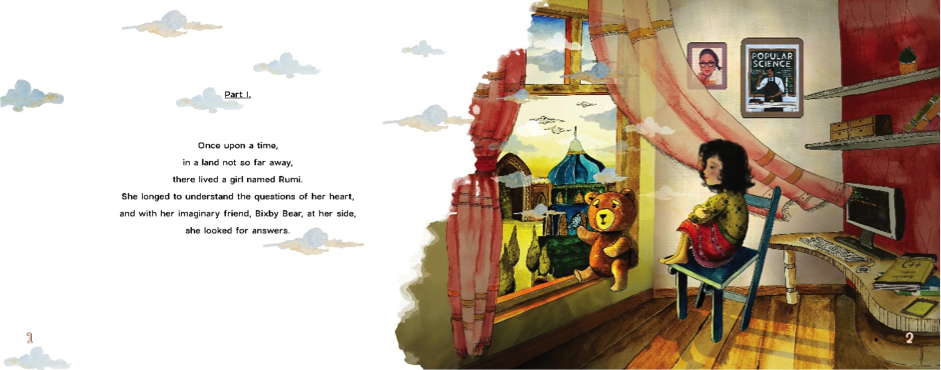
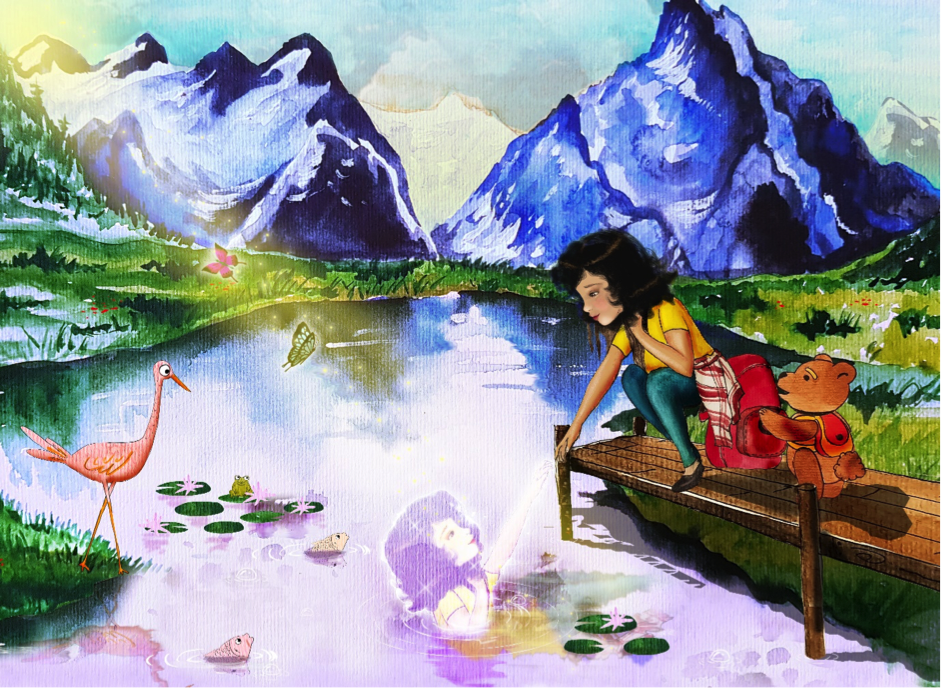
Rothstein channels Rumi’s themes of friendship, love, and transformation through the book’s main character, a young girl named Rumi, who enjoys yoga, traveling, doing science experiments, and of course playing with Bixby, her very wise teddy bear.
Rumi and Bixby’s adventures are gorgeously illustrated with almost 3-D watercolors which Rothstein commissioned from the acclaimed Iranian children’s illustrator, Nasim Jenabi. A graduate in puppet theater and architecture, Jenabi is known for her detailed watercolor technique that richly expresses the many different emotions behind each image. Given Rothstein’s own diverse background (his mother’s family descend from African-American slaves, while his father’s family are Ashkenazi Jews) as well as Jenabi’s deeply rooted Iranian traditions, it’s not surprising that the illustrations depict a multicultural world, inhabited by children and adults of many ethnicities.
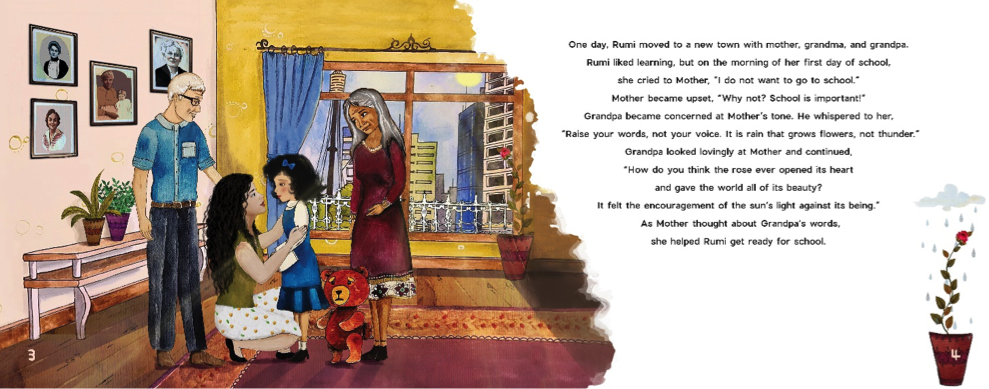
We first meet Rumi, sitting on her bedroom floor with Bixby Bear, as she prepares for school and wonders about her future.
“I do not know the answers,” Bixby Bear replies. “All I can say is this: Learn from others but do not follow the stories that came before you. You must create your own path.” “But I do not want to walk the path alone,” Rumi said anxiously. “Others may walk the journey with you, but nobody can walk it for you,” said Bixby Bear.
Friendship
Later, Rumi cries to her mother, that she does not want to go to school. Her mother is upset and yells, “Why not? School is important!” Then, Rumi’s Grandfather, concerned, whispers to Mother, “Raise your words, not your voice. It is rain that grows flowers, not thunder.
How do you think the rose ever opened its heart and gave the world all of its beauty?
It felt the encouragement of the sun’s light against its being.”
Reflecting the increasing reality of absent fathers in our society, Rumi’s father is silently absent from the book. Rather, Rumi’s grandparents serve as formative influences on her. Early in the book, Rumi telephones her grandparents to ask them about friendship.
“Friendship is the water of life. Don’t be afraid to jump in!
But run, my dear, from anyone who weakens your precious and growing wings.”
Her Grandfather incants.
“Remember that friendship is a home where two souls meet, a field beyond who is right and wrong. But, if you are looking for a friend who is faultless, then you will be friendless. And if you are annoyed by their every rub, then how will you ever be polished?”
Loneliness
When Rumi confides her loneliness to Bixby, the bear replies, poetically:
It’s okay to feel sad at times. But brighter days do not always come to you, sometimes you must go to them. In a night full of darkness, be like the sun who volunteers its light to others.
As Rumi shares her worries with her mother, grandparents, and Bixby, her understanding of life, love and friendship deepens with each new experience. Rumi slowly begins to understand Rumi the poet’s ideas about friendship, which she too begins, tentatively to start channeling.
Rothstein also interweaves his own poetic touch with the poetry of Rumi. As Rumi matures as a character, her classmates are drawn to her strength, confidence and wisdom, “the kind that forms when someone builds tall their inner music.”
Will you give us the answers to our questions?” Rumi’s new friends ask.
“Do not seek the answers from me, for I cannot give them to you, Because then, you would not be able to live your own questions. Live the questions in the now. Then one day, maybe without even knowing it, your heart will live its w-way into the answers."
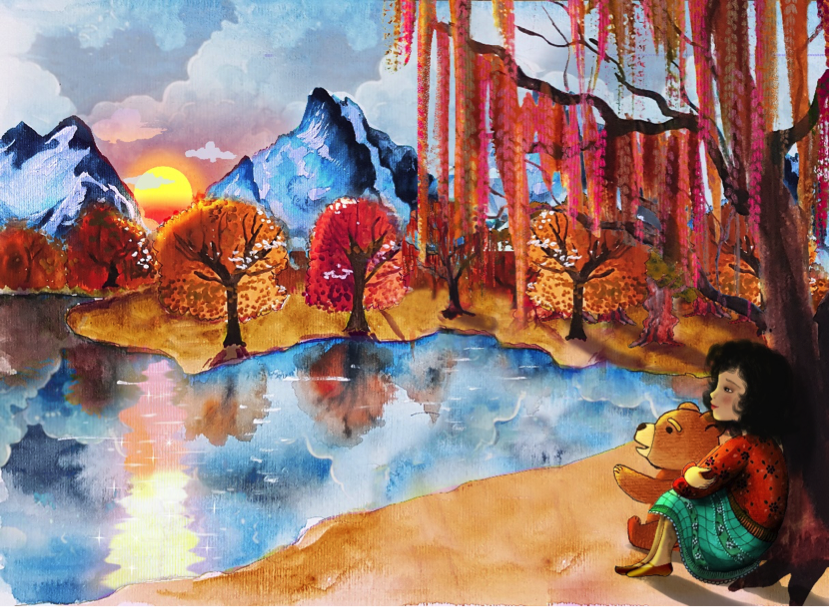
Transformation
The underlying theme of all of Rumi’s poems is transformation, and Rumi And Bixby Bear is just that – A story of transformation in which a shy, friendless, stuttering girl discovers that “Ever since the morning of my life, friendship heard my name and has been running through the schoolyard trying to catch me.”
"Look at the sunset! Can you hear the trees?” Bixby asks Rumi. Rumi looked around and admired the world and all of its beauty. “Isn’t it amazing? Even after all this time, the sun never says to the earth, ‘You owe me.’ Look what happens with a friendship like that. It becomes a love that lights the whole sky!”
This is a story that contains lessons and wisdom that will speak to any human being regardless of their age and profession but is targeted towards the young. Rothstein has created a free curriculum, which can be downloaded for free at http://www.rumiandbixbybear.com, for teachers and parents to discuss some of the ideas of self-growth and actualization explored throughout the book and, at the same time, explore Rumi’s poetry and metaphors in an entertaining way.
The world would be a better place if every child were to read, or have read to them, The Adventures of Rumi and Bixby Bear.


